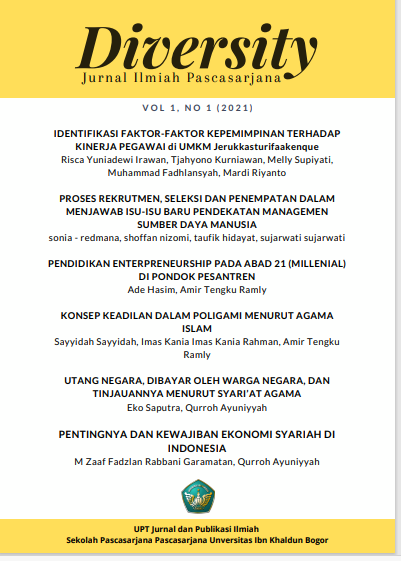UTANG NEGARA, DIBAYAR OLEH WARGA NEGARA, DAN TINJAUANNYA MENURUT SYARI'AT AGAMA
DOI:
https://doi.org/10.32832/djip-uika.v1i1.4358Abstract
Debt or in accounting terms is referred to as a liability at the conceptual and implementation level in the Islamic economic system is legal as long as it does not conflict with the principle of halalness and the principle of benefit. however, if the debt uses an interest instrument, the law is haram. Citizens are not obliged to pay off debts taken by the government, but those who are obliged to repay the debts in question are the officials or the government in power or if this is not possible, the next government is responsible for making payments when the mechanisms and processes for the facilities taken are in accordance with the procedures applies. However, if there is a distortion or fraud (deviation), the person obliged to return the debt payment obligation is an individual from the authorized official as the policy maker of the facilityReferences
Al Bukhari, Muhammad bin Ismail Abu Abdillah, (2001), Shahih Bukhari, Beirut: Daru Thauqun Najah
Al Mawardi, Abu Hasan Ali bin Muhammad, Al Ahkam As Sulthaniyah, Kairo: Darul Hadits
An Nasa'i, Abu Abdurrahman, (1986), Sunan An Nasa'I, Aleppo: Maktab Al Mathbu'at Al Islamiyah
As Suyuthi, (1990), Abdurrahman bin Abi Bakar, Al Asybah wan Nadzha'ir, Beirut: Darul Kitab Al ‘Alamiyah
Departemen Agama RI. (2016), Al Qur;an dan Terjemahnya, Jakarta: Maghfirah Pustaka
Erwandi Tarmizi, (2012), Harta Haram Muamalat Kontemporer, Bogor: BMI Publishing
Hendi Suhendi, (2014), Fiqh Muamalah, Jakarta: Rajawali Press
Ibnu Katsir, (1999), Tafsir Ibnu Katsir, Riyadh: Daruth Thayibah
Ibnu Majah, Abu Abdillah, Sunan Ibnu Majah, Beirut: Darul Ihya
Munawir, Ahmad Warson, (1984), Al-Munawir Kamus Arab-Indonesia, Surabaya: Pustaka Progressif
World Bank, (2020), International Debt Statistics 2021, Washington
Zallum, Abdul Qadim, (2004), Al Amwal Fii Daulah Khilafah, Terjemahan: Ahmad S., Jakarta: HTI-Press
https://www.merdeka.com/uang/negara-negara-yang-bangkrut-karena-utang.html?page=5







